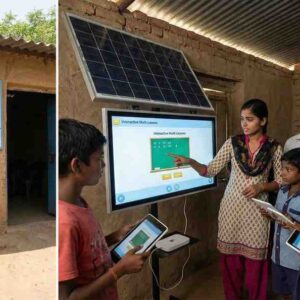India is on a fast track to establishing itself as a global economic force, and the education sector is playing a pivotal role in this transformation. Amid these educational evolutions, the resurgence of correspondence courses, now empowered with digital tools, is emerging as a significant player in enhancing the nation’s economic vigor and workforce capabilities.
What is a correspondence course?
A correspondence course is a flexible educational path where students engage in remote learning, typically via digital platforms or via mail, allowing them to study at their own pace. Ideal for busy adults, distant learners, or anyone needing a non-traditional education setup, these courses connect knowledge-seekers with opportunities, regardless of their location.
Empowering India’s Workforce
Correspondence courses are transforming educational access across India’s expansive and varied landscape, offering crucial skills development without the high costs or logistical challenges of traditional schooling.
- Accessibility for Remote Learners: In many rural areas, where access to physical educational institutions is limited, correspondence courses offer a practical alternative. This is particularly vital for enabling participation in the broader economy from remote locations.
- Skill Diversification: These courses allow learners to adapt their skill sets to align with evolving economic needs, ranging from technological competencies to specialized agricultural techniques, thereby boosting both personal and national productivity.
Stimulating Key Economic Sectors
Correspondence courses have a direct impact on several critical sectors within the Indian economy by equipping a new generation of professionals with industry-relevant skills.
- IT and Services: As the global demand for tech expertise rises, correspondence courses in fields like software development, cybersecurity, and data science are preparing individuals to meet these needs, supporting India’s reputation as a technology leader.
- Agricultural Development: Tailored courses in advanced farming techniques are enabling agricultural workers to produce more efficiently and sustainably, which is essential for feeding the nation’s large population and reducing poverty.
Government Initiatives Supporting Educational Outreach
Recognizing the importance of scalable and flexible educational models, the Indian government has launched several initiatives to support the growth and development of correspondence courses:
- Skill India Mission: This ambitious initiative targets the upskilling of over 400 million Indians by 2022, utilizing correspondence courses as a key vehicle for achieving widespread vocational training.
- Digital India Campaign: Aimed at strengthening internet infrastructure across the country, this campaign enhances the reach and effectiveness of digital correspondence courses, facilitating better access to educational resources and e-learning platforms.
Building Economic Resilience
The flexible nature of correspondence courses makes them a strategic tool in enhancing India’s economic resilience, allowing for rapid adaptation to global economic shifts and demands.
- Quick Adaptation: The curriculum of correspondence courses can be swiftly updated to reflect the latest industry trends and technological advancements, providing learners with relevant and timely content.
- Encouraging Lifelong Learning: These courses foster a culture of continuous learning which is crucial in a dynamic global economic landscape.
Transformative Impact: Success Stories
Several stories from across the country illustrate the profound impact of correspondence courses on individual lives and communities:
- Technology Upskilling in Rural Areas: A young woman from Odisha used a correspondence course to learn computer applications and subsequently secured a job with a major IT firm, significantly improving her family’s socioeconomic status.
- Sustainable Farming Practices: A farmer in Punjab, through a correspondence course on sustainable agriculture, managed to double his crop yield without increasing his use of water or pesticides, showcasing the environmental and economic benefits of educated farming.
Conclusion: Strengthening Economic Foundations
Correspondence courses are proving to be more than just educational avenues—they are strategic tools in India’s economic development. By making education more accessible and aligned with industry needs, they are preparing a diverse, skilled, and adaptable workforce, essential for a robust Indian economy.
As India continues to face the complexities of a globalizing world, the significance of adaptable and accessible education grows. Correspondence courses, with their inherent flexibility and wide reach, are poised to play a crucial role in this educational and economic revolution, paving the way for a more prosperous and resilient future for all Indians.










